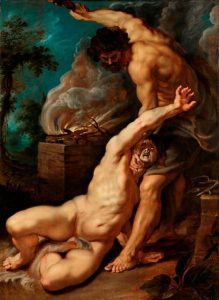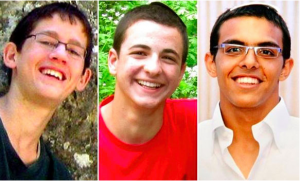This piece was contributed by Clark University CAMERA Fellow, Seth Greenwald.

We often hear the religious statement “Am I to be my brother’s keeper?”, a biblical reference to the story of Cain and Abel where Cain murdered his brother in cold blood and failed to take responsibility for his actions. In modern times however, one is not only responsible for actions taken by him or herself, but one is often further responsible, justly or unjustly, to condemn acts taken by his or her community. In a sense, failure to do so amounts to silent acceptance, thereby following in the footsteps of the biblical villain of Cain, the first murderer.
It was said after the Shoah, the Holocaust, in which 6 million Jews and a total of 11 million people were murdered based on their faith or identity, that those individuals who stood against the horrors of the Nazi regime must be honored. In fact, in the Jewish State of Israel, at Yad Vashem, a world famous Holocaust memorial, the Garden of the Righteous memorializes over 2,000 individuals who stood against the genocidal Nazis. These righteous individuals took responsibility to protect their fellow man, not only by speaking out, but by physically risking their own lives to do so.
In recent times, there has been great controversy as to whose responsibility it is to condemn acts of terror or hatred, and who can be held culpable for these actions. I can settle this controversy in a single statement: leaders, insiders, within a community who stand with those who commit atrocities by failing to speak up, condone such actions by their silence. This does not mean that an individual who does not speak up is to blame for their community, but the silence of leadership in and of itself can often be deafening. Furthermore, an individual loses nothing by speaking up against atrocities within their own community and can only create a greater opportunity for mutual dialogue by doing so.
It has been the responsibility of Pope Francis to actively speak about the ‘leprosy’ of pedophilia that has infected the Catholic Church. According to the highest voice of authority in the Catholic community, 1/50 Priests has committed child abuse of some kind; it is an epidemic. However, the Pope has been acting with full authority to take actions against these disgusting individuals. As a light skinned, Jewish, American citizen, an outsider, I could speak against the injustices perpetrated within the Church, but would my voice really make an impact? Rather, the highest voice of the community speaking out, an insider within the community itself, is creating change.


When Jewish racists and extremists in Judea and Samaria commit atrocities against Arabs, attacking for no reason other than identity, it is the responsibility of Jewish leaders, and the government of Israel to condemn such attacks. This past summer, following the brutal kidnapping and murder of Mohammed Abu Khdeir, a Palestinian teenager, Prime Minister of Israel Benjamin Netanyahu stated, “I do not distinguish between terrorism and terrorism.” Just as the kidnappings of Eyal Yifrah, Gilad Shaer and Naftali Frankel were immediately investigated and responded to by the Israeli government, so too the perpetrator of this “reprehensible murder”, to quote the Prime Minister, was brought to justice by the Israeli government. While the revenge killing was a response to the deaths of the Fogel family and the kidnapping of the boys, the murder was no less reprehensible. In fact, the broader Jewish community as a whole spoke against the murder, among those, the Chief Rabbinate who came out with swift and broad condemnations.
As a member and insider of said community, I have the unique ability to speak out as strongly as I can against such injustices; recognizing that bigotry and hatred exists in my community like any other, allows me to take a proper stand in defending other aspects of Jewish or Israeli history. Failure to do so not only undermines my own arguments, but by my own logic, would place full responsibility on my leadership for condemnations of violence rather than allowing me to address such atrocities myself.
So too do Muslims, and in specific, the highest authorities of Islam, have the responsibly to condemn the string of terror attacks that have been perpetrated by the Islamic State, Boko Haram, Hamas, Islamic Jihad, and other terror radical Islamist organizations. Just as a few radical extremists do not define my community, and just as pedophilia does not define the entire Catholic community, neither does terrorism define the Islamic faith. However, a concerted effort by a small percentage of individuals claiming to represent the entire faith, has hijacked Islam and attempted to make it into a religion of hatred. Condemning such individuals not only serves the greater global community in regards to reaching towards a greater sense of acceptance and a reduction of Islamophobia, but considering the fact these Islamist groups target Muslims eight times more often than non-Islamic targets, doing so is in the self-interest of Islamic leaders.
To be sure, following the recent string of terror attacks; a few Muslim leaders in local communities have come out against the terror, explaining that this is not the nature of Islam. Unfortunately, such condemnations have been insufficient in changing the representation of Muslims worldwide, and such attacks have only led to an increase in Islamophobic sentiments, thereby endangering the entire community of 1.8 billion Muslims. In order to create true change, the highest Muslim authorities, just as the Pope has made sure to do, must condemn these acts of terror. This includes but is not limited to leaders like Abdul Aziz Al ash-Sheikh, the Grand Mufti of Saudi Arabia, the Ayatollah’s, and the Waqf on the Temple Mount, to name a few.
For our own part, we can all be insiders, condemning violence, hatred, prejudiced and lack of acceptance within our own communities; outside voices only have the ability to guide as a third party, not to create initial change. Change must come internally. We must all be the keepers of our own communities, and we must seek to be accepting of others attempting to create change within their communities. We must be our brother’s keepers if we truly want to create change.

